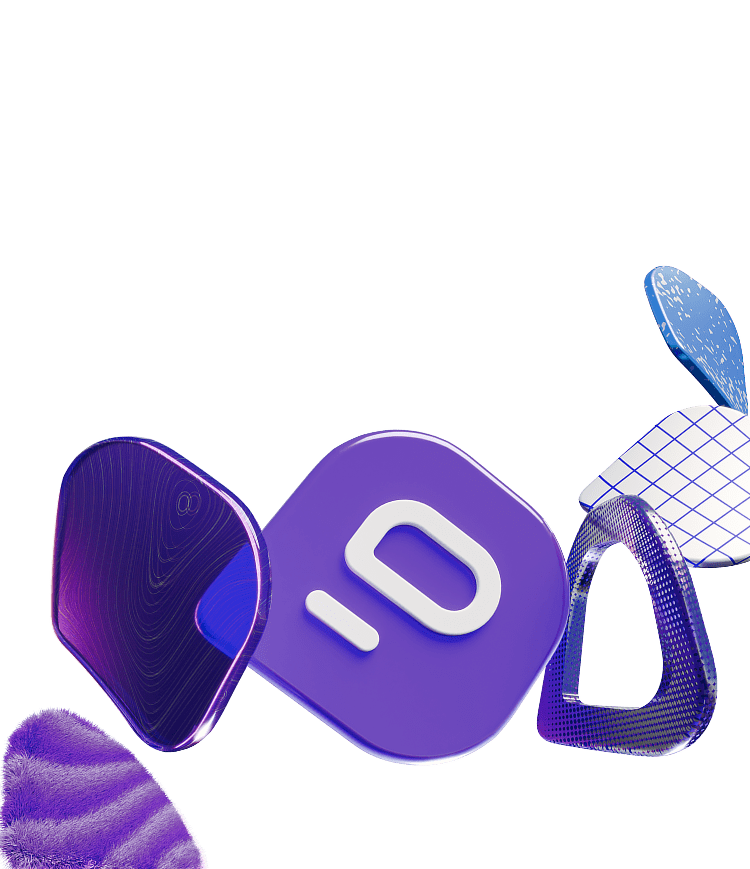La colaboración es un proceso que une a las personas y les ayuda a organizarse. Además, permite a los equipos dividir las responsabilidades y alcanzar logros formidables.
Sin embargo, la colaboración eficaz no es un don: es una habilidad, o un conjunto de habilidades que todos pueden desarrollar y mejorar.
Al desarrollar buenas habilidades en un equipo, se aumenta la eficiencia general, resultados importantes se mejoran y los objetivos comunes se logran más fácilmente.
En este artículo analizaremos:
- La definición de habilidades de colaboración,
- Las habilidades más importantes para la colaboración exitosa,
- Ejemplos de buenas habilidades de colaboración, y
- Maneras de mejorar las habilidades de colaboración para individuos y equipos.
¡Comencemos!
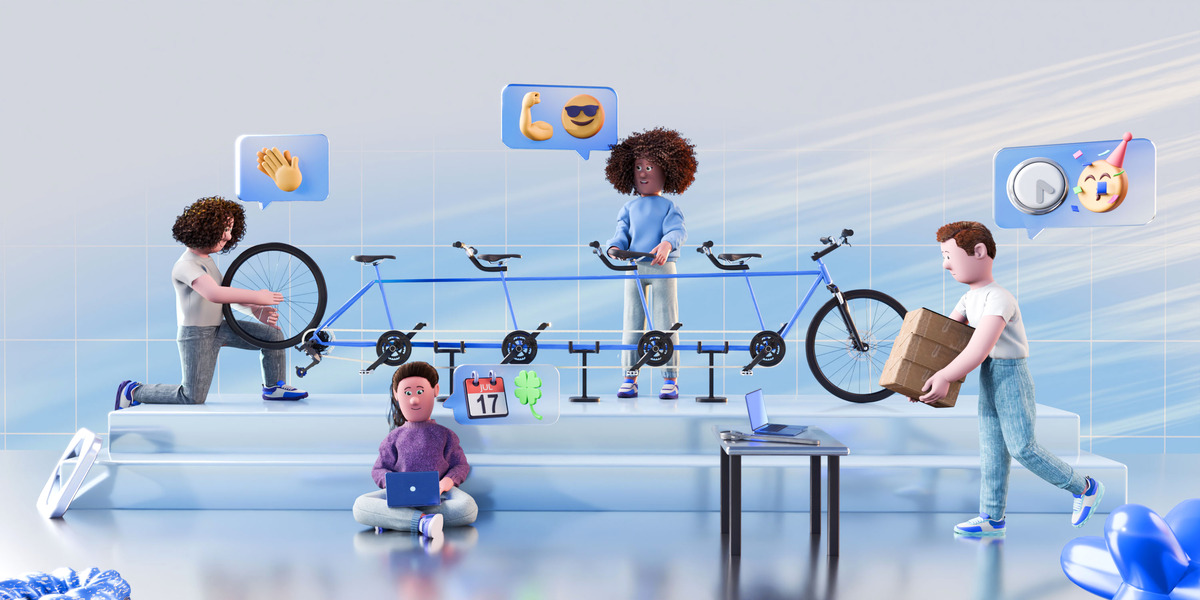
¿Qué son las habilidades de colaboración?
Las habilidades de colaboración incluyen varios comportamientos, las habilidades interpersonales y la mentalidad que ayuda a cada equipo funcionar y rendir mejor, para el beneficio de todas las partes involucradas y objetivos de la empresa a corto y largo plazo.
Al tomar en consideración diferentes aspectos de colaboración, podemos llegar a una definición integral de definición de habilidades de colaboración:
Las habilidades de colaboración son la agregación de habilidades identificadas como relevantes para el proceso de colaboración tales como:
- Comunicación en equipo,
- Inteligencia emocional, y
- Conocimiento operativo.
Por lo tanto, podemos observar un conjunto de habilidades colaborativas que nos permiten colaborar bien con los demás, y analizar comportamientos que impulsan los resultados positivos relacionados a colaboración efectiva.
Ejemplos de principales habilidades de colaboración en el lugar de trabajo
Aunque son conscientes de la naturaleza crucial de la colaboración, muchas personas todavía no se dan cuenta de qué habilidades necesitan desarrollar para reclamar el título de buen colaborador y jugador de equipo.
A fin de cuentas, las principales habilidades de colaboración en el lugar de trabajo en las que todo el mundo debería trabajar son:
- Comunicación,
- Apertura mental,
- Compromiso,
- Organización y delegación,
- Pensamiento a largo plazo,
- Confianza,
- Positividad, y
- Resolución de conflictos.
Entonces, analicemos cómo cada una de estas habilidades da forma a un entorno de trabajo colaborativo sólido.
Habilidad de colaboración 1: Comunicación
La comunicación grupal es vital para el éxito de cualquier equipo. Puede facilitar no sólo la colaboración sino también la toma de decisiones. Además, es una forma eficaz de gestionar y resolver conflictos dentro del equipo.
Sin embargo, comunicarse eficazmente en un grupo no es fácil; a veces, las personas que son excelentes comunicadores en un entorno individual no pueden encontrar una buena manera de comunicar sus pensamientos en un grupo.
Para adaptarse a todos sus miembros y sus diversos estilos de comunicación, es vital que el equipo deje espacio para todo tipo de comunicación y canales de comunicación.
Aquí hay un buen ejemplo de eso.
El equipo necesita reflexionar sobre el formato de su nueva propuesta. Aunque algunos miembros del equipo comenzaron a compartir sus ideas a través de mensajes de texto, uno de sus compañeros sugirió hacer una llamada, que otros aceptaron. Eligiendo un canal de comunicación más adecuado para la actividad que están realizando (lluvia de ideas), hicieron su comunicación más efectiva, ya que facilita compartir ideas y opiniones.
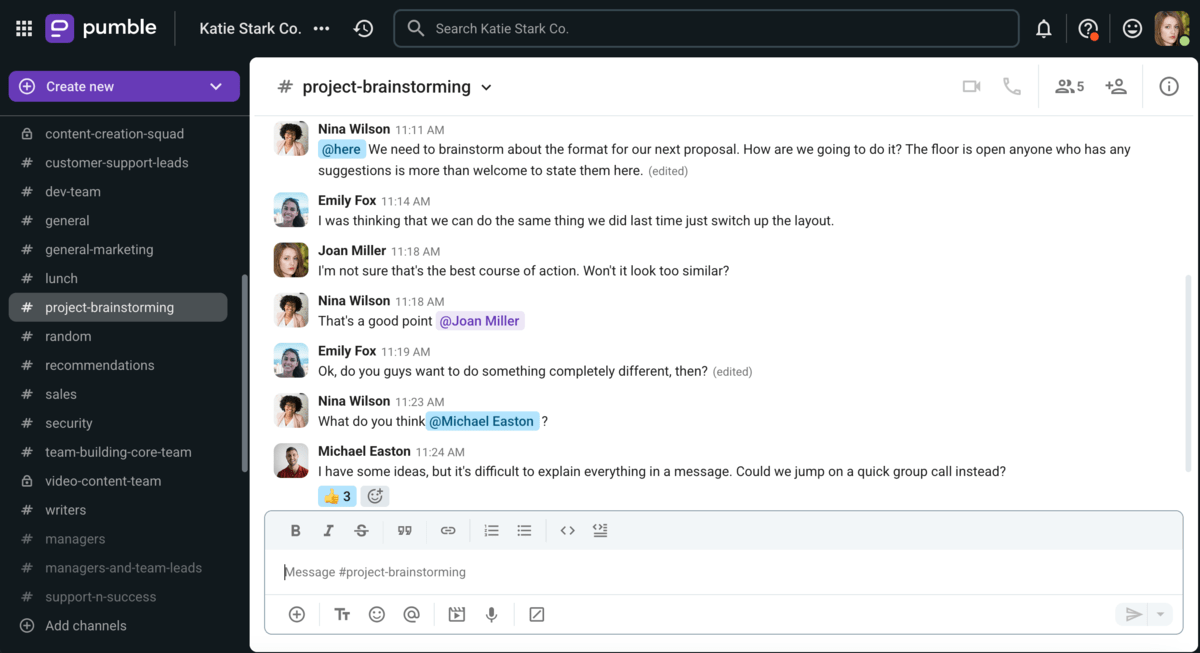
🎓 CONSEJO PRO DE PUMBLE
Mejorar la comunicación a nivel individual y grupal es vital para la colaboración. Si quieres saber más sobre cómo podrías mejorar la efectividad de tu grupo colaborativo, lee estos artículos:
Habilidad de colaboración 2: Apertura mental
Estar abierto a nuevas ideas y respetar que no todos piensan como nosotros es la base de una buena colaboración. Personas de mente abierta:
- Permiten que sus ideas sean cuestionadas, mejoradas o cuestionadas,
- Pueden admitir cuando se equivocan y cambian su perspectiva,
- Son humildes acerca de sus conocimientos pero no tienen vergüenza de compartirlos,
- Creen que vale la pena escuchar la voz y la opinión de todos, y
- Tienen un fuerte sentido de empatía.
Pero, ¿cómo se traduce eso en colaborar como equipo?
Bueno, los equipos colaboradores rara vez tienen miembros que tengan las mismas habilidades y experiencia. En cambio, la mayoría de los equipos son multifuncionales — con miembros de diferentes partes de la empresa, que tienen conjuntos de habilidades complementarias (pero diferentes) y trabajan juntos para lograr un objetivo común.
Al trabajar en un equipo de este tipo, es vital que tengamos en cuenta que cada miembro puede tener una perspectiva diferente cuando se trata de problemas o temas específicos.
Estar abierto a esos puntos de vista y nuevas ideas cultiva un ambiente productivo y colaborativo.
Habilidad de colaboración 3: Compromiso y adaptabilidad
De todas las habilidades de colaboración, el compromiso o la adaptabilidad pueden ser las más difíciles de dominar.
Cuando trabajamos como parte de un equipo, esperamos que todo salga sin problemas. Sin embargo, la realidad de la mayoría de los proyectos es que algo saldrá mal: los plazos se retrasarán, las prioridades cambiarán y las ideas se descartarán.
La forma en que reaccionamos y nos comportamos en tales situaciones es un reflejo de nuestra adaptabilidad.
La capacidad de dejar de lado nuestras propias necesidades y trabajar con otros para lograr un punto medio (o un compromiso) es vital para el éxito de cada equipo. Cuando los miembros de un equipo tienen puntos de vista o ideas contradictorias, su capacidad para llegar a un punto medio determina la probabilidad de su éxito general.
Dar prioridad a encontrar una solución eficaz sobre tener razón es de suma importancia para la colaboración en equipo porque puede ayudar a los miembros del equipo a:
- Trabajar sin conflictos,
- Resolver discusiones y problemas más rápidamente,
- Proponer soluciones mejores y más innovadoras, y
- Llevarse mejor.
Por ejemplo, un creador de vídeos y un especialista en redes sociales pueden no estar de acuerdo sobre el mejor momento para publicar un nuevo producto de vídeo. Sin embargo, ambos pueden encontrar un compromiso y una solución aceptable que satisfaga las necesidades de ambas partes, como se muestra en el ejemplo a continuación.
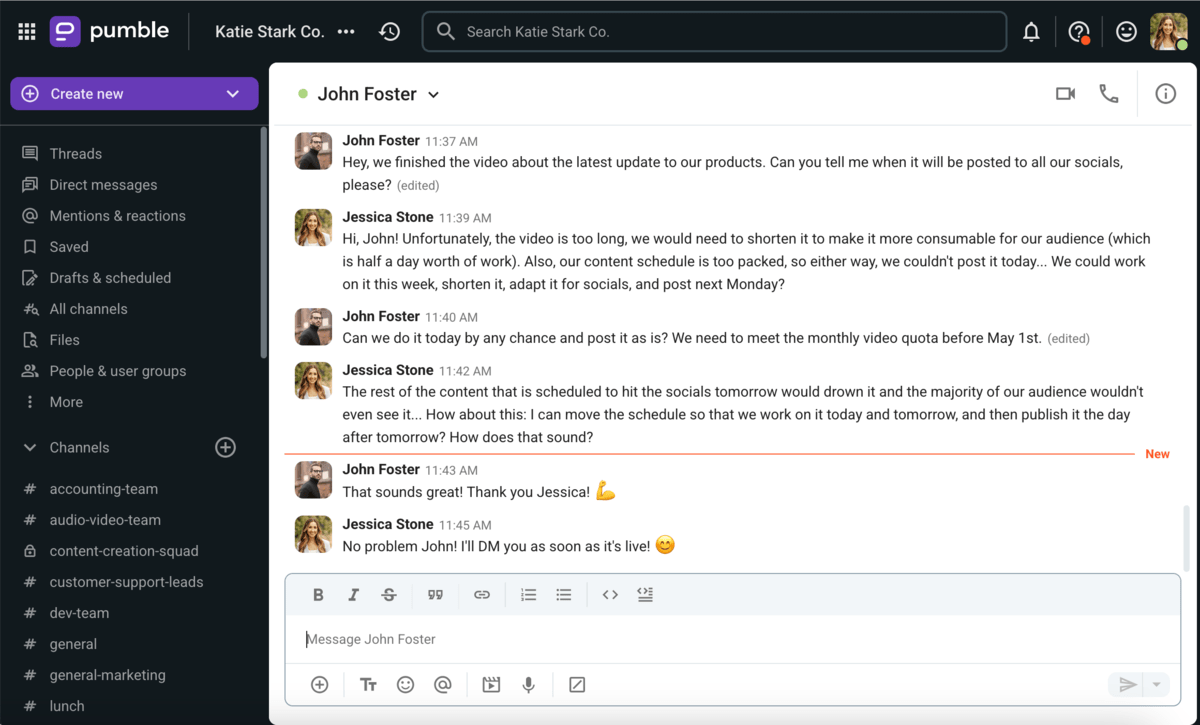
Agiliza la comunicación con Pumble
Habilidad de colaboración 4: Organización y delegación
Organizar la carga de trabajo y delegar tareas es vital para el éxito. Si algunos miembros del equipo están demasiado ocupados mientras que otros no tienen tareas, el trabajo en cuestión no se realizará (o no se hará bien). Es más, tampoco habrá ninguna colaboración entre los miembros.
Según Gretchen Anderson, autora del libro Mastering Collaboration: Make Working Together Less Painful and More Productive, darle un papel a todos los miembros del equipo es primordial. Ella afirma que asignar un rol a todos hace que el equipo sea más eficiente porque:
- Facilita la prueba de nuevas ideas,
- Ayuda a las personas a canalizar su energía,
- Ayuda a determinar y mantener límites,
- Motiva a todos los participantes, y
- Reduce la tensión innecesaria asociada con la delegación de tareas.
Habilidad de colaboración 5: Pensamiento a largo plazo
Ser capaz de pensar a largo plazo e imaginar tu objetivo, así como todas las rutas potenciales que el equipo podría tomar para alcanzar ese objetivo, es pensamiento o previsión a largo plazo.
Cada proyecto tiene una visión compartida o un resultado ideal. Los buenos colaboradores están comprometidos con ese resultado y son conscientes de todo el alcance del proyecto. Saben cuál es el papel de cada uno y cómo y por qué ese papel contribuirá al objetivo final.
Este es un buen ejemplo de cómo el pensamiento a largo plazo podría mejorar la colaboración en un equipo mostrado en Pumble, una aplicación de comunicación empresarial.
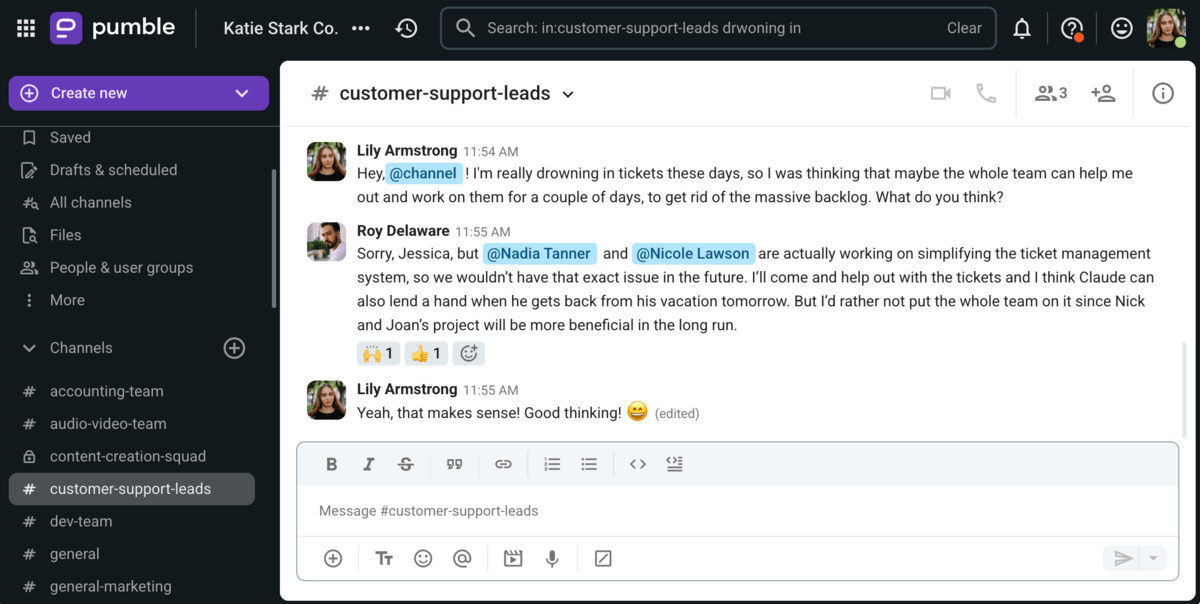
Optimiza los procesos del equipo con Pumble
Habilidad de colaboración 6: Confianza
La confianza es nuestra creencia de que nuestros compañeros de equipo tienen las habilidades y el conocimiento necesarios para tomar decisiones o ejecutar tareas. La confianza ayuda a la colaboración, pero no es un requisito previo para el éxito.
Los equipos que tienen miembros que confían entre sí son más innovadores, porque la confianza permite tomar decisiones y resolver problemas más rápidamente. Sin embargo, se necesita mucho tiempo para generar confianza en un grupo, incluso si es pequeño.
Entonces, contrariamente a la creencia popular, la confianza no es una necesidad para el éxito (pero ciertamente ayuda).
La confianza ayuda a los equipos a superar los obstáculos a la colaboración, por lo que es una de las habilidades colaborativas clave.
Habilidad de colaboración 7: Positividad
Cuando estamos motivados y positivos, podemos ayudar a los demás mejorando su estado de ánimo.
Promover la positividad en un equipo estimula la eficiencia. Además, mantener una actitud positiva puede ayudar a impulsar todas las demás habilidades colaborativas. Cuando somos positivos, nosotros:
- Podemos generar confianza en un equipo más fácilmente,
- Son más de mente abierta,
- Nos comunicamos mejor, y
- Estamos más dispuestos a llegar a un acuerdo.
Habilidad de colaboración 8: Resolución de conflictos
Los conflictos son una parte inevitable del trabajo en equipo, pero, para una colaboración productiva, es importante cómo las personas los manejan.
La capacidad para resolver conflictos de forma eficaz incluye varias habilidades, tales como:
- Controlar las emociones,
- Gestionar el desacuerdo,
- Negociar una solución que satisfaga las necesidades de ambas partes.
Estas habilidades ayudan a las personas a reconocer diferentes perspectivas, lo que les ayuda a encontrar una solución aceptable de la que ambas partes puedan beneficiarse.
¿Cómo mejorar las habilidades de colaboración?
Si te preguntas cómo desarrollar y mejorar tus habilidades de colaboración, estas son algunas de las formas más efectivas que te ayudarán a convertirte en un gran colaborador:
- Crea una seguridad psicológica en tu equipo,
- Comunica tus intenciones y pensamientos con claridad y establece objetivos precisos y claros,
- Escucha activamente a otras personas y reconoce su papel en el equipo,
- Comprométete y evita asignar culpas,
- Brinda críticas constructivas a tus compañeros de equipo, agradece su feedback, y celebra el éxito de tu equipo, y
- Evalúa las habilidades de comunicación en tu entorno laboral.
Aprendamos más sobre ellas.
Consejo 1: Crea seguridad psicológica
La seguridad psicológica, o el conocimiento de que somos libres de expresar nuestras opiniones e incluso cometer errores sin temor a las repercusiones, no sólo es frágil sino también vital para el éxito de cualquier equipo.
Según una investigación de Harvard Business Review, el éxito de equipos diversos depende en gran medida de la seguridad psicológica.
Para crear un ambiente de trabajo psicológicamente seguro, los líderes deben:
- Hacer que la gente se sienta incluida,
- Valorar su punto de vista,
- Pedirle feedback y opiniones, y
- Animarla a aprender de sus errores.
Para lograr esto, es fundamental que los líderes den ejemplo y modelen los comportamientos que quieren ver en sus equipos.
Consejo 2: Comunica intenciones y establece objetivos claros y precisos
Debido a que la colaboración es tan compleja, es fácil que los miembros de un equipo colaborador se pierdan en sus propias tareas y asignaciones. Por eso es vital que cada miembro se comunique de forma transparente.
Sin embargo, eso no es suficiente. Para fomentar la colaboración, cada miembro debe comunicar sus intenciones en detalle.
Por ejemplo, siempre es una buena idea comunicar a tus compañeros de equipo qué tarea estás realizando, qué planeas hacer con ella y cuándo planeas terminarla.
De esa manera, evitarás cualquier posible superposición de tareas con otros miembros y reducirás las posibilidades de malentendidos.
Por ejemplo, en la captura de pantalla del espacio de trabajo de Pumble a continuación, podemos ver que los miembros del equipo de audio y vídeo están organizando su carga de trabajo considerando fechas límite y prioridades.
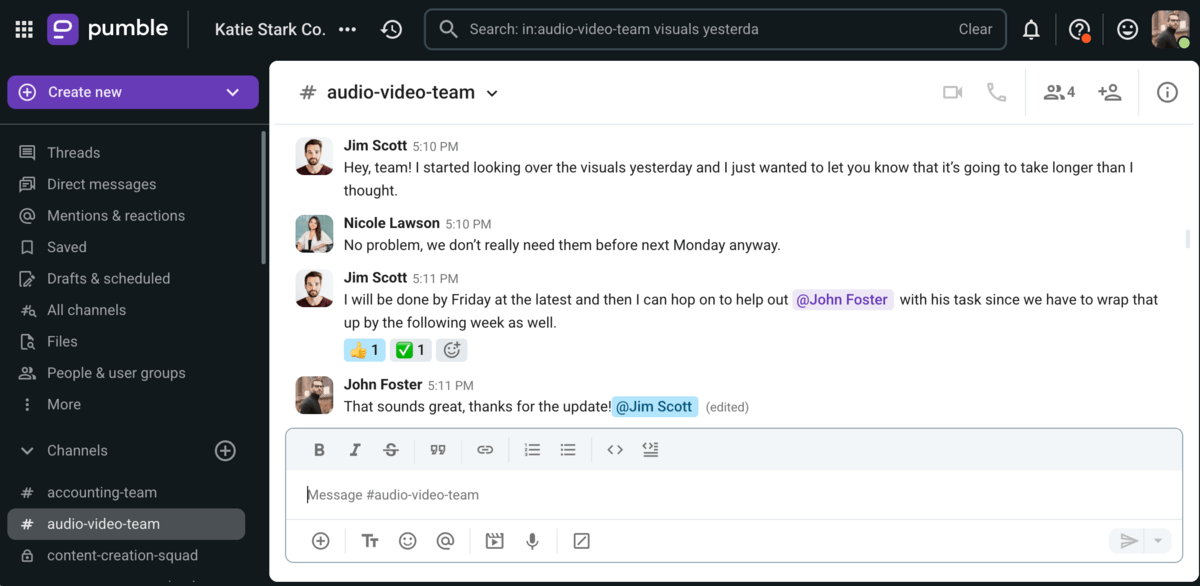
Un equipo que colabora bien también garantiza que todos sus objetivos estén claramente establecidos. Tienen objetivos individuales y de equipo que deben cumplir y que todos conocen.
Esta conciencia contribuye a una colaboración más profunda porque hace que las personas se comprometan más plenamente.
Consejo 3: Utiliza la escucha activa y reconoce a los demás
Al ser un oyente activo, comprenderás mejor a tus compañeros de equipo, sus emociones y sus comportamientos.
Si bien la comprensión es vital, también es importante que reconozcas abiertamente los roles que tienen todas las demás personas en tu equipo. Al reconocer lo que otros hacen por el equipo (o por ti específicamente), estás construyendo una mejor relación con ellos y fomentando un ambiente positivo.
🎓 Consejo Pro de Pumble
Si quieres obtener más información sobre cómo mejorar las habilidades de escucha activa, consulta este artículo:
Consejo 4: Aprende a llegar a acuerdo mutuo y no echar culpas
Saber llegar a acuerdo mutuo conduce a mayores niveles de cohesión del equipo y a un ambiente más positivo.
Aún así, incluso en ambientes positivos, ocurren errores. Son una parte esencial del progreso.
Cuando suceden, es importante que tu equipo no recurra a señalar con el dedo. Los desafíos surgen todo el tiempo en los equipos. Superarlos sin asignar culpas es fundamental.
Estas situaciones son la oportunidad perfecta para:
- Analizar los protocolos que tiene tu equipo,
- Trabajar juntos, y
- Encontrar soluciones.
Gestionar una situación como esa no es fácil. El objetivo (mejorar la colaboración sin alienar a otros miembros del equipo culpabilizando) se logra mejor proporcionando críticas constructivas.
Consejo 5: Proporciona críticas constructivas y agradece el feedback
Proporcionar y recibir feedback o críticas constructivas son dos caras de la misma moneda. Es más, ambos lados son igualmente importantes para el éxito de tu equipo.
Son esenciales para una buena comunicación en equipo, que es el principal facilitador de la colaboración.
Los mejores consejos para dar el feedback constructivo son:
- Comienza con lo positivo,
- Establece la confianza,
- Sé específico,
- Planifica el feedback regular,
- Construye sobre lo positivo,
- Permanece honesto,
- Entrega el feedback cara a cara,
- Proporciona el contexto suficiente,
- No hables A los empleados (abraza el diálogo), y
- Da el feedback procesable.
Saber cómo recibir la crítica constructiva es tan importante como saber cómo darla. Ser receptivo a la crítica constructiva y no tener miedo de admitir que uno está equivocado es vital para generar confianza y fomentar un entorno colaborativo.
Echa un vistazo al intercambio en Pumble a continuación para ver un ejemplo de la crítica constructiva.
John, el líder del equipo, primero aborda los puntos fuertes y celebra el éxito de Jim, un nuevo editor de vídeo. Luego, lo orienta en la dirección correcta para cumplir con las pautas del equipo y la empresa en cuanto a la consistencia de la marca. Jim acepta con gusto el feedback y agradece los comentarios para el feedback constructivo.
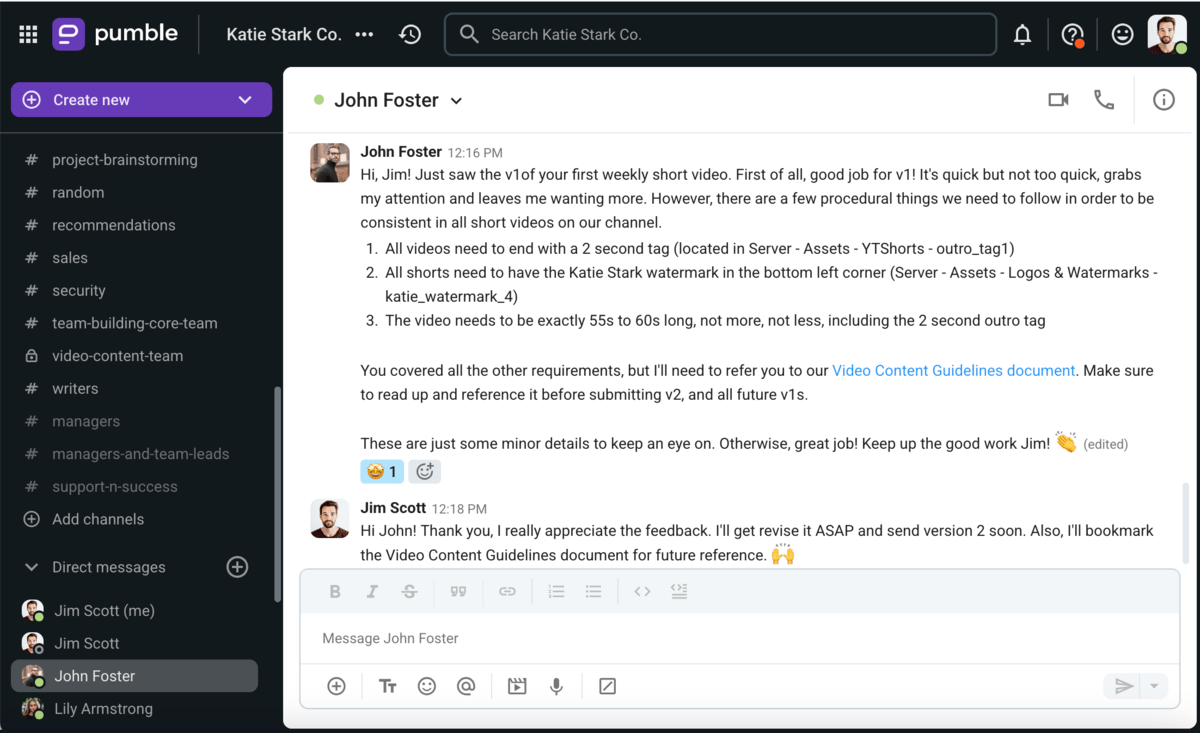
Mejora la comunicación del equipo con Pumble
A veces recibir críticas es más fácil que darlas. Cuando no estamos de acuerdo con nuestros compañeros de trabajo, es vital que se lo hagamos saber de manera respetuosa y profesional.
🎓 Consejo Pro de Pumble
Si te preguntas cuál es la mejor manera de brindar o solicitar críticas constructivas, consulta este artículo:
Consejo 6: Evalúa las habilidades de comunicación en tu entorno laboral
Al final, asegúrate de prestar atención a las habilidades de comunicación, que son prácticamente inseparables de las habilidades de colaboración. La comunicación eficaz se puede considerar con seguridad un requisito previo para una colaboración sólida en cualquier equipo.
Las habilidades de comunicación deseadas comúnmente en la mayoría de los equipos incluyen:
- Hacer preguntas abiertas,
- Hacer preguntas cerradas,
- Aclarar,
- Parafrasear,
- Utilizar facilitadoras,
- Evaluar señales de comunicación no verbales,
- Saber cuándo permanecer en silencio,
- Comunicarse en escrito, y
- Comunicarse en remoto.
Asegúrate de explorar habilidades de comunicación importantes aún más y abordar el fortalecimiento de comunicación en tu equipo desde otra perspectiva, ya que diferentes enfoques funcionarán mejor para diferentes equipos.
🎓 Consejo Pro de Pumble
Para analizar con más detalle las habilidades de comunicación en el entorno de trabajo y cómo desarrollarlas, consulta el siguiente artículo de nuestro centro de conocimiento:
¿Por qué son importantes las habilidades de colaboración?
Según un artículo de HRM Online, las habilidades de colaboración fuertes generan mayores ingresos, por lo que son las principales habilidades que los empleadores buscan en sus empleados.
Las habilidades de colaboración son fundamentales para un trabajo en equipo eficaz porque:
- Mejoran la cohesión del grupo, lo que mejora el rendimiento general del equipo,
- Contribuyen a una mejor resolución de problemas, y
- Ayudan a los miembros del equipo a aprender unos de otros.
Entonces, echemos un vistazo más de cerca a cada una de estas razones por las que todos deberían trabajar para mejorar las habilidades de colaboración.
Razón 1: Las habilidades de colaboración mejoran el desempeño general del equipo
Las habilidades de colaboración mejoran la cohesión del grupo, y la cohesión del grupo hace que los miembros del equipo se sientan conectados:
- Unos con otros,
- Con los objetivos del grupo, y
- Con valores compartidos.
Eso, a su vez, ayuda al equipo a ser más eficaz y productivo.
Cuando las personas forman parte de un equipo cohesivo, trabajan en nombre de su equipo y no en nombre de ellos mismos, lo que aumenta el éxito de la colaboración y el desempeño del equipo.
Razón 2: Las habilidades de colaboración contribuyen a una mejor resolución de problemas
Cuando las personas tienen habilidades de colaboración fuertes, pueden abordar y resolver problemas de manera cooperativa y, por lo tanto, de manera más eficaz.
Las personas con fuertes habilidades de comunicación en equipo pueden comunicar mejor sus opiniones así como entender y aceptar puntos de vista de otras personas.
Cuando todos aportan su perspectiva, las posibilidades de que el equipo encuentre soluciones adecuadas se aumentan.
Razón 3: Las habilidades de colaboración ayudan a los miembros del equipo a aprender unos de otros
Finalmente, la colaboración contribuye a compartir conocimientos y habilidades.
Las personas con habilidades de colaboración fuertes tienen más probabilidades de difundir sus conocimientos y aprender de otras personas.
Mejora tus habilidades de colaboración con Pumble
Cuando se trata de colaboración, siempre hay margen de mejora. Sin embargo, elegir la herramienta de comunicación y colaboración adecuada para el trabajo puede llevar rápidamente la cooperación con tus compañeros de equipo al siguiente nivel.
Ahí es donde entra Pumble.
Pumble es una aplicación de comunicación en equipo todo en uno que ayuda a equipos fomentar colaboración a través funciones poderosas, como:
- Direct messaging — for important 1 on 1 agreements,
- Canales — espacios grupales para organizar el cargo de trabajo y hacer referencias a procesos importantes para todo el equipo o subequipo,
- Hilos — para seguir la organización y delegar las conversaciones en canales fácilmente,
- Archivos compartidos — para implementar una comunicación escrita efectiva a través de documentos,
- Pantalla compartida — para compartir fácilmente la información crucial con tu equipo,
- Acceso de invitado — para incluir colaboradores externos en tu comunicación,
- Menciones — para obtener la atención de los miembros importantes en canales más grandes, y
- Videoconferencias — para lluvia de ideas, discusiones de temas importantes y team bonding.
Aumenta la productividad de tu equipo y mejora la colaboración.
Cómo revisamos esta publicación: Nuestros escritores y editores monitorean las publicaciones y las actualizan cuando hay nueva información disponible, para mantenerlas frescas y relevantes. Actualizado: 23 de abril de 2025
Actualizado: 23 de abril de 2025 

